人教新目标中考专区二轮专题----形容词副词专题复习课件(30张PPT)
文档属性
| 名称 | 人教新目标中考专区二轮专题----形容词副词专题复习课件(30张PPT) |  | |
| 格式 | zip | ||
| 文件大小 | 2.8MB | ||
| 资源类型 | 教案 | ||
| 版本资源 | 人教新目标(Go for it)版 | ||
| 科目 | 英语 | ||
| 更新时间 | 2020-05-05 19:25:41 | ||
图片预览

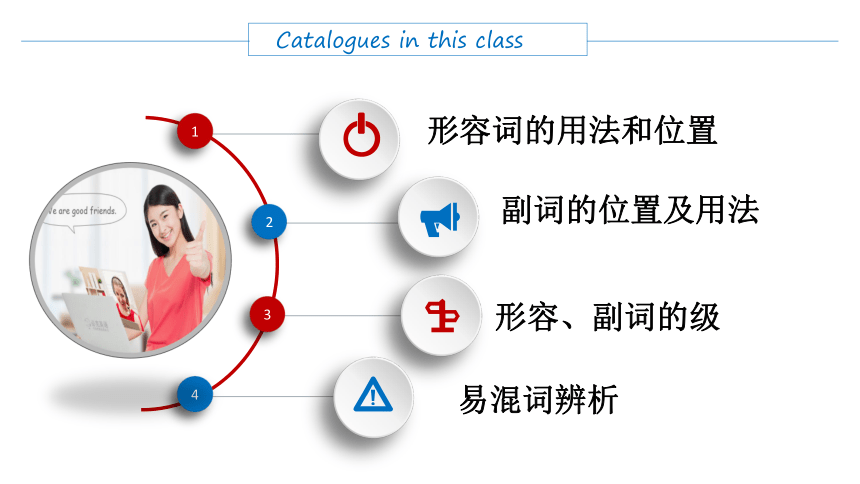
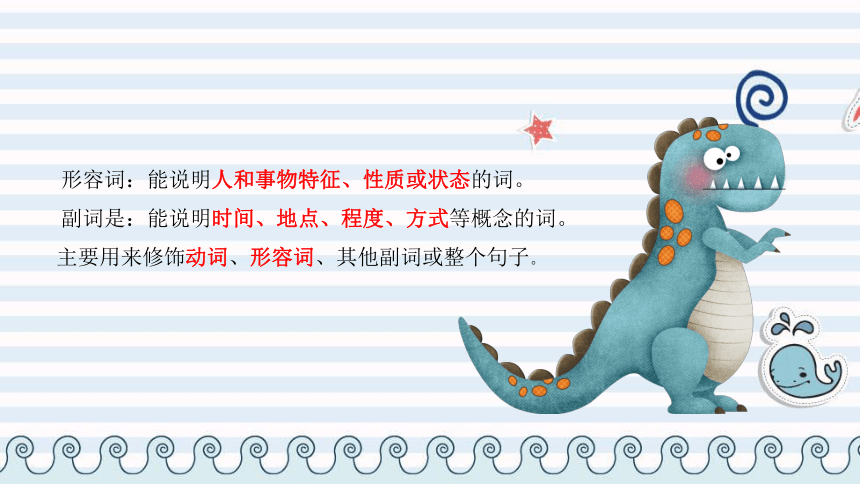
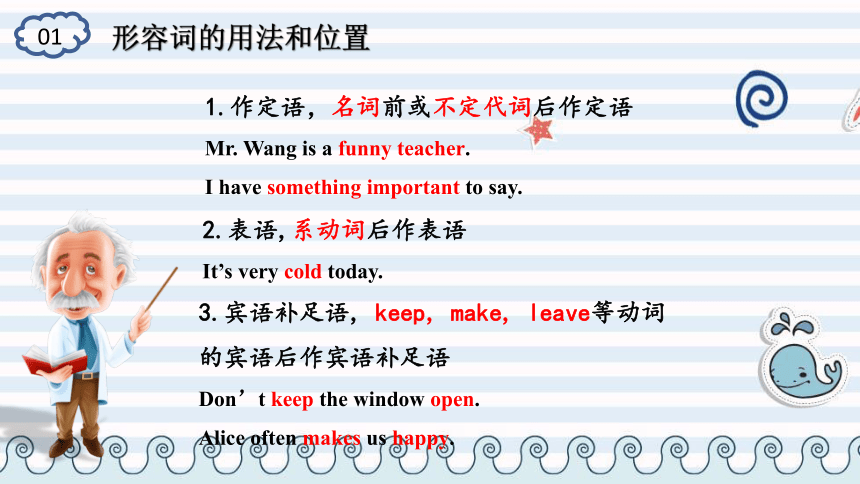
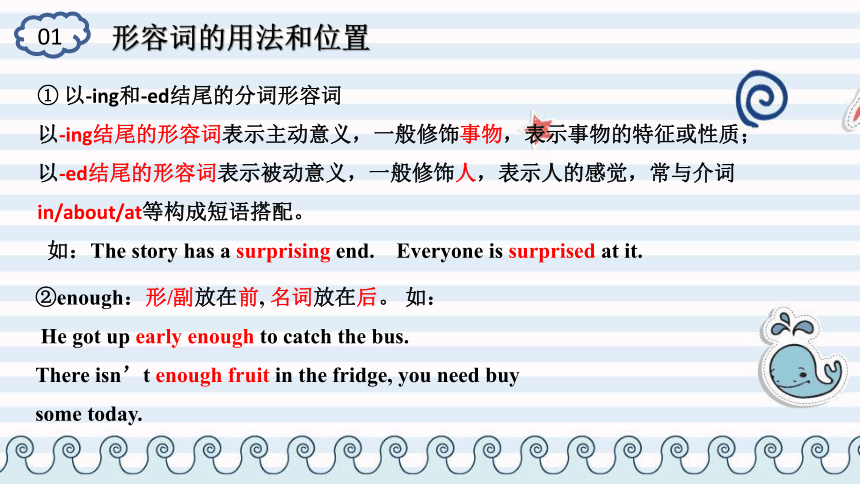
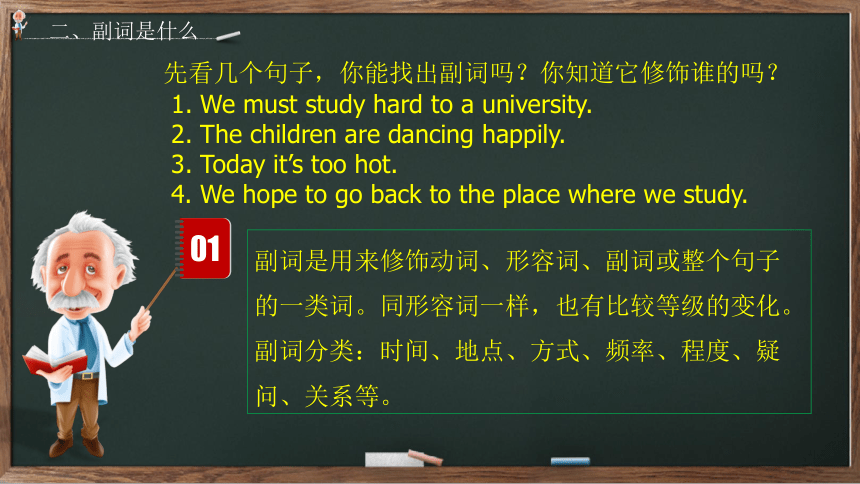
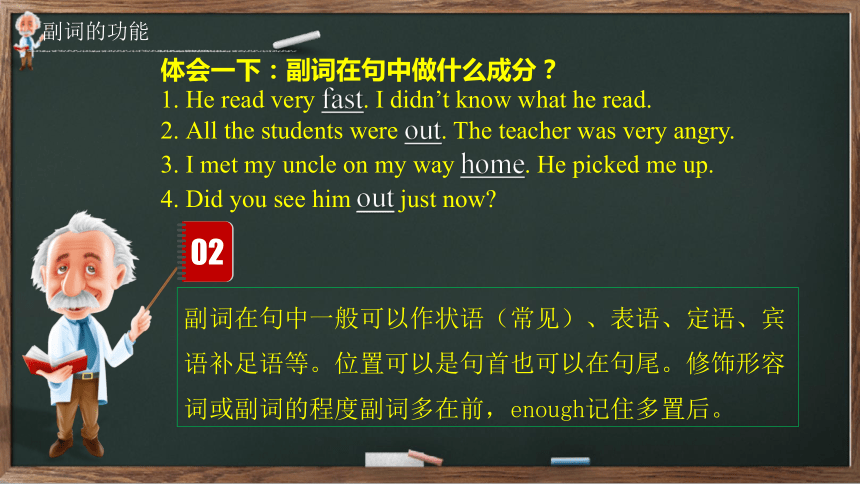
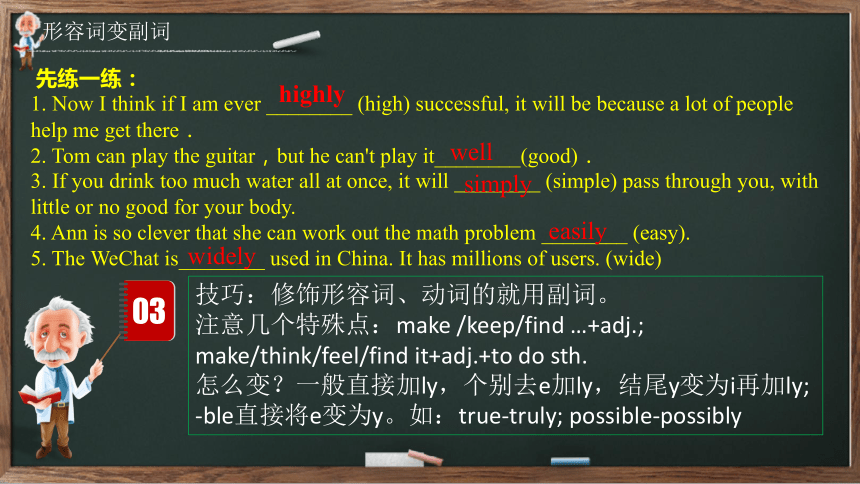

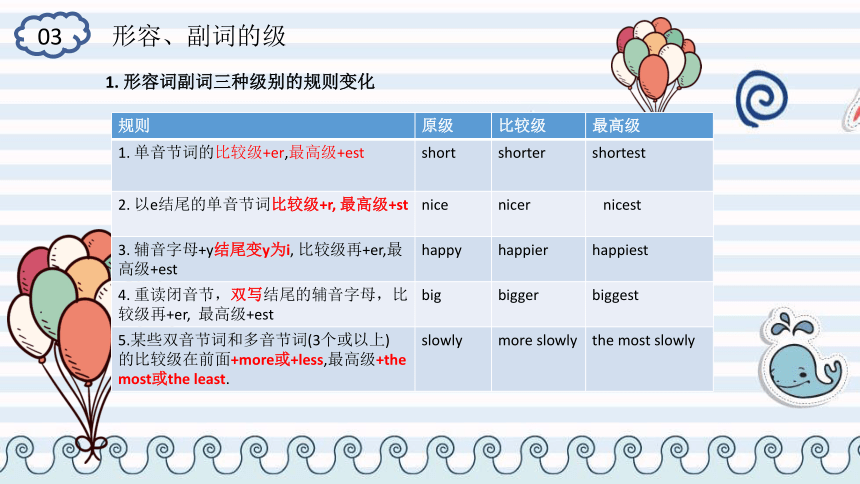
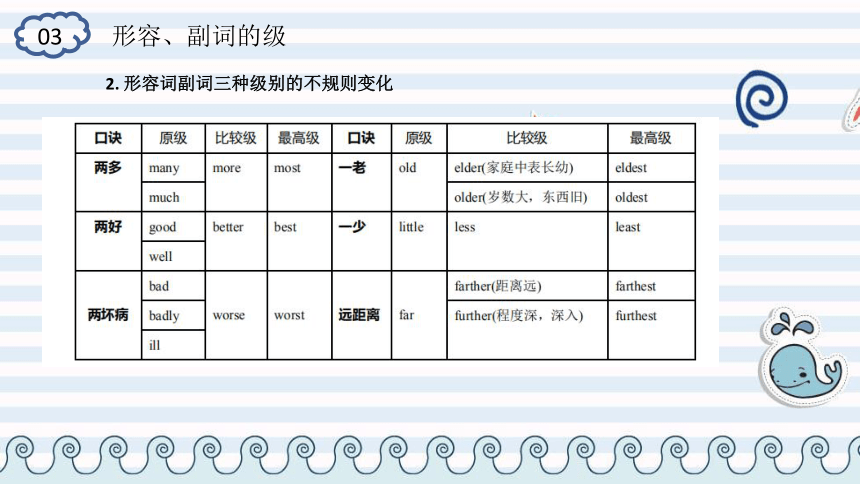
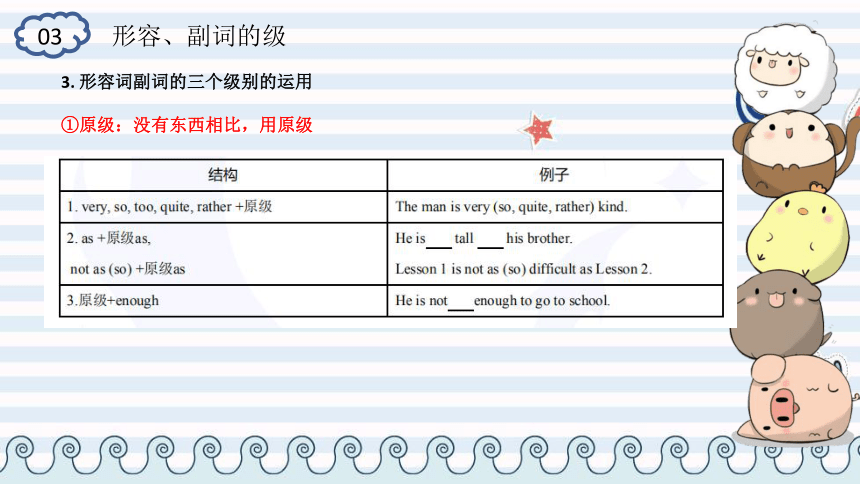
文档简介
(共30张PPT)
九年级英语专题复习
形容词和副词
1
2
3
4
Catalogues
in
this
class
形容词的用法和位置
副词的位置及用法
易混词辨析
形容、副词的级
形容词:能说明人和事物特征、性质或状态的词。
副词是:能说明时间、地点、程度、方式等概念的词。主要用来修饰动词、形容词、其他副词或整个句子。
01
形容词的用法和位置
1.作定语,名词前或不定代词后作定语
Mr.
Wang
is
a
funny
teacher.
I
have
something
important
to
say.
2.表语,系动词后作表语
It’s
very
cold
today.
3.宾语补足语,
keep,
make,
leave等动词的宾语后作宾语补足语
Don’t
keep
the
window
open.
Alice
often
makes
us
happy.
01
①
以-ing和-ed结尾的分词形容词
以-ing结尾的形容词表示主动意义,一般修饰事物,表示事物的特征或性质;
以-ed结尾的形容词表示被动意义,一般修饰人,表示人的感觉,常与介词in/about/at等构成短语搭配。
如:The
story
has
a
surprising
end.
Everyone
is
surprised
at
it.
②enough:形/副放在前,
名词放在后。
如:
He
got
up
early
enough
to
catch
the
bus.
There
isn’t
enough
fruit
in
the
fridge,
you
need
buy
some
today.
形容词的用法和位置
二、副词是什么
01
先看几个句子,你能找出副词吗?你知道它修饰谁的吗?
1.
We
must
study
hard
to
a
university.
2.
The
children
are
dancing
happily.
3.
Today
it’s
too
hot.
4.
We
hope
to
go
back
to
the
place
where
we
study.
副词是用来修饰动词、形容词、副词或整个句子的一类词。同形容词一样,也有比较等级的变化。
副词分类:时间、地点、方式、频率、程度、疑问、关系等。
副词的功能
02
副词在句中一般可以作状语(常见)、表语、定语、宾语补足语等。位置可以是句首也可以在句尾。修饰形容词或副词的程度副词多在前,enough记住多置后。
体会一下:副词在句中做什么成分?
1.
He
read
very
fast.
I
didn’t
know
what
he
read.
2.
All
the
students
were
out.
The
teacher
was
very
angry.
3.
I
met
my
uncle
on
my
way
home.
He
picked
me
up.
4.
Did
you
see
him
out
just
now
先练一练:
1.
Now
I
think
if
I
am
ever
________
(high)
successful,
it
will
be
because
a
lot
of
people
help
me
get
there.
2.
Tom
can
play
the
guitar,but
he
can't
play
it________(good).
3.
If
you
drink
too
much
water
all
at
once,
it
will
________
(simple)
pass
through
you,
with
little
or
no
good
for
your
body.
4.
Ann
is
so
clever
that
she
can
work
out
the
math
problem
________
(easy).
5.
The
WeChat
is________ used
in
China.
It
has
millions
of
users.
(wide)
形容词变副词
03
技巧:修饰形容词、动词的就用副词。
注意几个特殊点:make
/keep/find
…+adj.;
make/think/feel/find
it+adj.+to
do
sth.
怎么变?一般直接加ly,个别去e加ly,结尾y变为i再加ly;
-ble直接将e变为y。如:true-truly;
possible-possibly
highly
well
simply
easily
widely
1.
This
is
a
great
movie.
The
director
made
it
really
_______________(successful).
2.
--I'm
__________(true)
worried
about
my
best
friend
Linda.
--I
see.
But
I
think
she
is
old
enough.
She
can
look
after
herself
well
in
another
country.
3.
The
apples
in
this
store
are
very
expensive.
You
can
buy
apples
much
more_________
(cheap)
in
that
store.
4.
Do
you
think
Eliza
was
the
act
who
sang
_________________(beautiful),
in
the
show
tonight
5.
Though
he
lives
by
himself,
he
doesn't
feel
____________(alone).
6.
I
always
expect
to
sit
on
the
sofa
_____________(comfortable)
and
watch
sitcoms
on
weekends,
but
this
dream
never
comes
true.
7.
Having
enough
sleep
is
a
good
way
to
keep
ourselves
___________(health).
8. Give me my glasses. I can ______________(hard)see the words on the blackboard.
9.
He
played
the
piano
__________________(success)
than
we
have
thought.
10.
So
you
can
find
the
sky
__________(clear)
today.
趁热打铁,好好练练
successfully
truly
cheaply
most
beautifully
lonely
comfortably
healthy
hardly
clear
more
successfully
03
形容、副词的级
规则
原级
比较级
最高级
1.
单音节词的比较级+er,最高级+est
short
shorter
shortest
2.
以e结尾的单音节词比较级+r,
最高级+st
nice
nicer
nicest
3.
辅音字母+y结尾变y为i,
比较级再+er,最高级+est
happy
happier
happiest
4.
重读闭音节,双写结尾的辅音字母,比较级再+er,
最高级+est
big
bigger
biggest
5.某些双音节词和多音节词(3个或以上)
的比较级在前面+more或+less,最高级+the
most或the
least.
slowly
more
slowly
the
most
slowly
1.
形容词副词三种级别的规则变化
03
形容、副词的级
2.
形容词副词三种级别的不规则变化
03
形容、副词的级
3.
形容词副词的三个级别的运用
①原级:没有东西相比,用原级
03
形容、副词的级
②比较级:两者相比,用比较级
03
形容、副词的级
②比较级:两者相比,用比较级
03
形容、副词的级
③最高级:三者或以上相比,用最高级
小试牛刀
注意:副词的比较等级(同级比较as…as;
not
as/so…as..;
less…than…;
比较级、最高级)与形容词完全相同,只是副词的最高级可以省略the。
1.
-
What's
your
idea
about
family
education
-
kids
learn
to
be
independent,
it
is
for
their
future.
A. The
earlier,
the
better
B. The
more,
the
more
C. The
earlier,
the
earlier
D. The
better,
the
earlier
2.The
volunteer
spoke
as
_____
as
she
could
to
make
the
visitors
understand
her.
A. clearly B. more
clearly C. most
clearly
D. clear
3.
Tom
wrote
his
words
__________
among
his
class.
I
must
learn
from
him.
A. careful
B. carefully
C. more
carefully D. most
carefully
4.(2019·江苏常州)—Can
you
give
me
some
advice
on
how
to
be
slimmer
—Eat
______
meat
and
______
cakes.
A.less;
less
B.fewer;
fewer
C.less;
fewer
D.fewer;
less
1.
ago
与before
ago
用于一般过去时,before
用于完成时,所指的时间从过去的某一时刻算起。
He
was
a
student
three
years
ago.
但是He
has
taught
here
since
ten
years
ago.
I
have
met
her
before.
He
had
been
a
teacher
three
years
before.
2.
except
与
besides
except
指除了整体中的一个部分,剩下的(含有否定意义)
besides指除了…
以外,还有(包含在整体中)
The
others
went
swimming
except
him
in
our
class
yesterday.
He
was
ill.
We
all
knew
about
the
news
besides
you.
You
needn’t
tell
us.
3.
already与yet
already
用于肯定句中,表示“已经”
yet
用于疑问句中,表示“已经”,用于否定句中,表示“还”
I
have
already
finished
the
homework.
Have
you
finished
your
homework
yet
No
,
I
have
not
yet
.
四、易混词辨析
04
4.
very与much
表示“很,非常”
eg:It's
very
nice.
He
speaks
English
very
well.
She
said
she
was
much
better
than
before.
I
like
English
very
much.
I
like
English
much.
very用于修饰形容词或副词的原级;much修饰形容词或副词的比较级,修饰动词用much或very
much。
5.
hard
和
hardly
eg:He
studies
hard.
Stone
is
very
hard.
He
hardly
studies.
hard作为副词,意为“猛烈地,辛苦地,努力地”;用作形容词,意为“困难的,坚硬的”;hardly表否定,意为“几乎不”。
04
6.
too,
also,
either
表示“也(不)”
eg:I'm
fine,
too.
Chinese
take-away
food
is
also
popular.
We
also
have
eleven
players
in
a
team.
We
don't
like
the
same
colour,
either.
too和also用于肯定句中,too常用语口语中,置于句末;also常用语书面语中,置于be动词之后,行为动词之前;either用于否定句句尾。
7.
too
much
和
much
too
too
much
意为“太多,非常”,相当于形容词,常用来修饰不可数名词,也可单独使用。eg:
There
is
too
much
ice
on
the
road,
and
you
must
be
careful.
相当于名词eg:Too
much
was
happening
all
at
once.
用作副词eg:Don't
eat
too
much.
而much
too用于修饰形容词或副词,表示程度。
eg:His
father
drove
his
car
too
much
fast.
注意:too
many
也是“太多”,用于修饰可数名词复数。
eg:
Too
many
people
died
from
the
disease.
04
8.
sometime,
some
time,
sometimes,
some
times
sometime
表示将来或过去的“某个时候”;
some
time则指“一段时间”。
eg:New
students
will
come
to
our
school
sometime
next
week.
It
took
me
some
time
to
finish
reading
the
book.
sometimes指“有时候”;some
times表示“倍数,次数”。
eg:
Sometimes,
I
know
what
she's
thinking.
I
have
been
to
the
Great
Wall
some
times.
【教你这么记】
分开“一段时间”,相聚“某个时候”;sometimes“有时”分开“几次”。
练习:1.
-How
often
do
you
write
to
your
father?-_____________.
2.
—When
can
you
finish
the
work?—___________
next
month.
3.
—How
many
times
do
you
watch
TV
every
week?
—
_______________.
4.
—How
long
can
I
be
away?—I
think
you
can
be
away
for
___________.
04
Sometimes
Sometime
Some
times.
some
time
9.
how
long;
how
often;
how
soon;
how
far
how
long指多长时间,主要用来对一段时间(如three
days,
four
weeks
等)提问
eg:
How
long
ago
was
it
这是多久前的事了
how
often指每隔多久,主要用来对频率副词或状语(如once
a
week等)提问
eg:
—How
often
does
he
come
here
—Once
a
month.
how
soon指再过多久,主要用来对表示将来的一段时间(in
an
hour,
in
two
weeks
等)提问
eg:
How
soon
can
you
come
how
far
指多远,主要表示距离
eg:
How
far
is
it
from
school
to
home
这么一练:
How
_________did
you
live
in
China
About
three
days,
I
guess.
How__________do
you
watch
a
movie
Hardly
ever,
I’m
not
available.
How
________
can
you
finish
your
homework
Wait
a
minute,
in
about
ten
minutes.
How
_________is
it
from
here
to
the
park
It’s
ten
minutes’
walk.
04
long
often
soon
far
10.
but,
however,
yet,
while
He
is
a
clever
boy,
but
he
doesn’t
work
hard.
He
is
a
clever
boy.
However,
he
doesn’t
work
hard.
Xiao
Ming
likes
playing
basketball
while
his
brother
likes
playing
football.
He
has
worked
hard
on
the
work
for
a
year
,
yet
he
failed
finally.
①but:口语常用词,语气较强,泛指与前述情况相反。后没有逗号,直接连接分句;
②however:表转折关系,语气稍弱于but,连接性也弱一些,因而常作插入语。后有逗号相隔,可放句末。
eg:
It's
raining
hard.
However,
I
still
want
to
go
there.
完形填空中常考but和however,需要多注意选填这两者时,主要观察是否有逗号相隔。
③yet,常用于否定句。指不管作出多大努力或让步,仍达不到预期的结果。一般放在句末,前面一般不用加逗号。
用于肯定句中时,意思是“仍然,还得。”yet用作连词,意思是“然而,但是”,连接意思相反的分句。
eg:He
was
poor,
yet
happy.
④while:表对比,程度弱一些。连接的两个句子为对等关系,强调同时。
eg:While
Mary
was
writing
a
letter,
the
children
were
playing
outside.
注意:这里要注意while还有“当...时”的意思,强调主句的动作在从句动作的发生的过程中或主从句两个动作同时发生,引导的时间状语从句中的动词必须是延续性动词。
练习一下:(2019·上海)Money
is
important
,________it
can’t
buy
everything.
A.for
B.but
C.or
D.so
他努力工作,但以失败告终。(翻译)
①He
worked
hard,
______
he
failed
at
last.
②He
worked
hard.
_____________,
he
failed
at
last.
(2019江苏宿迁)
Eddie
was
sleeping______
Millie
was
reading
a
magazine.
A.
until
B.
while
C.
before
D.
after
She
said
she
would
be
late,
________she
arrived
on
time.
A.
or
B.
and
C.
before
D.
yet
04
B
but
However
B
D
形容词和副词专练
中考链接
sunny
careless
badly
taller
heavily
helpful
smoothly
impolite
heavily
satisfied
atient
armful
ogether
orry
oudly
ervous
eak
ired
heaper
The
more
the
happier
as
cold
as
not
so/as
as
is
better
than
more
and
more
beautiful
even
more
carefully
九年级英语专题复习
形容词和副词
1
2
3
4
Catalogues
in
this
class
形容词的用法和位置
副词的位置及用法
易混词辨析
形容、副词的级
形容词:能说明人和事物特征、性质或状态的词。
副词是:能说明时间、地点、程度、方式等概念的词。主要用来修饰动词、形容词、其他副词或整个句子。
01
形容词的用法和位置
1.作定语,名词前或不定代词后作定语
Mr.
Wang
is
a
funny
teacher.
I
have
something
important
to
say.
2.表语,系动词后作表语
It’s
very
cold
today.
3.宾语补足语,
keep,
make,
leave等动词的宾语后作宾语补足语
Don’t
keep
the
window
open.
Alice
often
makes
us
happy.
01
①
以-ing和-ed结尾的分词形容词
以-ing结尾的形容词表示主动意义,一般修饰事物,表示事物的特征或性质;
以-ed结尾的形容词表示被动意义,一般修饰人,表示人的感觉,常与介词in/about/at等构成短语搭配。
如:The
story
has
a
surprising
end.
Everyone
is
surprised
at
it.
②enough:形/副放在前,
名词放在后。
如:
He
got
up
early
enough
to
catch
the
bus.
There
isn’t
enough
fruit
in
the
fridge,
you
need
buy
some
today.
形容词的用法和位置
二、副词是什么
01
先看几个句子,你能找出副词吗?你知道它修饰谁的吗?
1.
We
must
study
hard
to
a
university.
2.
The
children
are
dancing
happily.
3.
Today
it’s
too
hot.
4.
We
hope
to
go
back
to
the
place
where
we
study.
副词是用来修饰动词、形容词、副词或整个句子的一类词。同形容词一样,也有比较等级的变化。
副词分类:时间、地点、方式、频率、程度、疑问、关系等。
副词的功能
02
副词在句中一般可以作状语(常见)、表语、定语、宾语补足语等。位置可以是句首也可以在句尾。修饰形容词或副词的程度副词多在前,enough记住多置后。
体会一下:副词在句中做什么成分?
1.
He
read
very
fast.
I
didn’t
know
what
he
read.
2.
All
the
students
were
out.
The
teacher
was
very
angry.
3.
I
met
my
uncle
on
my
way
home.
He
picked
me
up.
4.
Did
you
see
him
out
just
now
先练一练:
1.
Now
I
think
if
I
am
ever
________
(high)
successful,
it
will
be
because
a
lot
of
people
help
me
get
there.
2.
Tom
can
play
the
guitar,but
he
can't
play
it________(good).
3.
If
you
drink
too
much
water
all
at
once,
it
will
________
(simple)
pass
through
you,
with
little
or
no
good
for
your
body.
4.
Ann
is
so
clever
that
she
can
work
out
the
math
problem
________
(easy).
5.
The
is________ used
in
China.
It
has
millions
of
users.
(wide)
形容词变副词
03
技巧:修饰形容词、动词的就用副词。
注意几个特殊点:make
/keep/find
…+adj.;
make/think/feel/find
it+adj.+to
do
sth.
怎么变?一般直接加ly,个别去e加ly,结尾y变为i再加ly;
-ble直接将e变为y。如:true-truly;
possible-possibly
highly
well
simply
easily
widely
1.
This
is
a
great
movie.
The
director
made
it
really
_______________(successful).
2.
--I'm
__________(true)
worried
about
my
best
friend
Linda.
--I
see.
But
I
think
she
is
old
enough.
She
can
look
after
herself
well
in
another
country.
3.
The
apples
in
this
store
are
very
expensive.
You
can
buy
apples
much
more_________
(cheap)
in
that
store.
4.
Do
you
think
Eliza
was
the
act
who
sang
_________________(beautiful),
in
the
show
tonight
5.
Though
he
lives
by
himself,
he
doesn't
feel
____________(alone).
6.
I
always
expect
to
sit
on
the
sofa
_____________(comfortable)
and
watch
sitcoms
on
weekends,
but
this
dream
never
comes
true.
7.
Having
enough
sleep
is
a
good
way
to
keep
ourselves
___________(health).
8. Give me my glasses. I can ______________(hard)see the words on the blackboard.
9.
He
played
the
piano
__________________(success)
than
we
have
thought.
10.
So
you
can
find
the
sky
__________(clear)
today.
趁热打铁,好好练练
successfully
truly
cheaply
most
beautifully
lonely
comfortably
healthy
hardly
clear
more
successfully
03
形容、副词的级
规则
原级
比较级
最高级
1.
单音节词的比较级+er,最高级+est
short
shorter
shortest
2.
以e结尾的单音节词比较级+r,
最高级+st
nice
nicer
nicest
3.
辅音字母+y结尾变y为i,
比较级再+er,最高级+est
happy
happier
happiest
4.
重读闭音节,双写结尾的辅音字母,比较级再+er,
最高级+est
big
bigger
biggest
5.某些双音节词和多音节词(3个或以上)
的比较级在前面+more或+less,最高级+the
most或the
least.
slowly
more
slowly
the
most
slowly
1.
形容词副词三种级别的规则变化
03
形容、副词的级
2.
形容词副词三种级别的不规则变化
03
形容、副词的级
3.
形容词副词的三个级别的运用
①原级:没有东西相比,用原级
03
形容、副词的级
②比较级:两者相比,用比较级
03
形容、副词的级
②比较级:两者相比,用比较级
03
形容、副词的级
③最高级:三者或以上相比,用最高级
小试牛刀
注意:副词的比较等级(同级比较as…as;
not
as/so…as..;
less…than…;
比较级、最高级)与形容词完全相同,只是副词的最高级可以省略the。
1.
-
What's
your
idea
about
family
education
-
kids
learn
to
be
independent,
it
is
for
their
future.
A. The
earlier,
the
better
B. The
more,
the
more
C. The
earlier,
the
earlier
D. The
better,
the
earlier
2.The
volunteer
spoke
as
_____
as
she
could
to
make
the
visitors
understand
her.
A. clearly B. more
clearly C. most
clearly
D. clear
3.
Tom
wrote
his
words
__________
among
his
class.
I
must
learn
from
him.
A. careful
B. carefully
C. more
carefully D. most
carefully
4.(2019·江苏常州)—Can
you
give
me
some
advice
on
how
to
be
slimmer
—Eat
______
meat
and
______
cakes.
A.less;
less
B.fewer;
fewer
C.less;
fewer
D.fewer;
less
1.
ago
与before
ago
用于一般过去时,before
用于完成时,所指的时间从过去的某一时刻算起。
He
was
a
student
three
years
ago.
但是He
has
taught
here
since
ten
years
ago.
I
have
met
her
before.
He
had
been
a
teacher
three
years
before.
2.
except
与
besides
except
指除了整体中的一个部分,剩下的(含有否定意义)
besides指除了…
以外,还有(包含在整体中)
The
others
went
swimming
except
him
in
our
class
yesterday.
He
was
ill.
We
all
knew
about
the
news
besides
you.
You
needn’t
tell
us.
3.
already与yet
already
用于肯定句中,表示“已经”
yet
用于疑问句中,表示“已经”,用于否定句中,表示“还”
I
have
already
finished
the
homework.
Have
you
finished
your
homework
yet
No
,
I
have
not
yet
.
四、易混词辨析
04
4.
very与much
表示“很,非常”
eg:It's
very
nice.
He
speaks
English
very
well.
She
said
she
was
much
better
than
before.
I
like
English
very
much.
I
like
English
much.
very用于修饰形容词或副词的原级;much修饰形容词或副词的比较级,修饰动词用much或very
much。
5.
hard
和
hardly
eg:He
studies
hard.
Stone
is
very
hard.
He
hardly
studies.
hard作为副词,意为“猛烈地,辛苦地,努力地”;用作形容词,意为“困难的,坚硬的”;hardly表否定,意为“几乎不”。
04
6.
too,
also,
either
表示“也(不)”
eg:I'm
fine,
too.
Chinese
take-away
food
is
also
popular.
We
also
have
eleven
players
in
a
team.
We
don't
like
the
same
colour,
either.
too和also用于肯定句中,too常用语口语中,置于句末;also常用语书面语中,置于be动词之后,行为动词之前;either用于否定句句尾。
7.
too
much
和
much
too
too
much
意为“太多,非常”,相当于形容词,常用来修饰不可数名词,也可单独使用。eg:
There
is
too
much
ice
on
the
road,
and
you
must
be
careful.
相当于名词eg:Too
much
was
happening
all
at
once.
用作副词eg:Don't
eat
too
much.
而much
too用于修饰形容词或副词,表示程度。
eg:His
father
drove
his
car
too
much
fast.
注意:too
many
也是“太多”,用于修饰可数名词复数。
eg:
Too
many
people
died
from
the
disease.
04
8.
sometime,
some
time,
sometimes,
some
times
sometime
表示将来或过去的“某个时候”;
some
time则指“一段时间”。
eg:New
students
will
come
to
our
school
sometime
next
week.
It
took
me
some
time
to
finish
reading
the
book.
sometimes指“有时候”;some
times表示“倍数,次数”。
eg:
Sometimes,
I
know
what
she's
thinking.
I
have
been
to
the
Great
Wall
some
times.
【教你这么记】
分开“一段时间”,相聚“某个时候”;sometimes“有时”分开“几次”。
练习:1.
-How
often
do
you
write
to
your
father?-_____________.
2.
—When
can
you
finish
the
work?—___________
next
month.
3.
—How
many
times
do
you
watch
TV
every
week?
—
_______________.
4.
—How
long
can
I
be
away?—I
think
you
can
be
away
for
___________.
04
Sometimes
Sometime
Some
times.
some
time
9.
how
long;
how
often;
how
soon;
how
far
how
long指多长时间,主要用来对一段时间(如three
days,
four
weeks
等)提问
eg:
How
long
ago
was
it
这是多久前的事了
how
often指每隔多久,主要用来对频率副词或状语(如once
a
week等)提问
eg:
—How
often
does
he
come
here
—Once
a
month.
how
soon指再过多久,主要用来对表示将来的一段时间(in
an
hour,
in
two
weeks
等)提问
eg:
How
soon
can
you
come
how
far
指多远,主要表示距离
eg:
How
far
is
it
from
school
to
home
这么一练:
How
_________did
you
live
in
China
About
three
days,
I
guess.
How__________do
you
watch
a
movie
Hardly
ever,
I’m
not
available.
How
________
can
you
finish
your
homework
Wait
a
minute,
in
about
ten
minutes.
How
_________is
it
from
here
to
the
park
It’s
ten
minutes’
walk.
04
long
often
soon
far
10.
but,
however,
yet,
while
He
is
a
clever
boy,
but
he
doesn’t
work
hard.
He
is
a
clever
boy.
However,
he
doesn’t
work
hard.
Xiao
Ming
likes
playing
basketball
while
his
brother
likes
playing
football.
He
has
worked
hard
on
the
work
for
a
year
,
yet
he
failed
finally.
①but:口语常用词,语气较强,泛指与前述情况相反。后没有逗号,直接连接分句;
②however:表转折关系,语气稍弱于but,连接性也弱一些,因而常作插入语。后有逗号相隔,可放句末。
eg:
It's
raining
hard.
However,
I
still
want
to
go
there.
完形填空中常考but和however,需要多注意选填这两者时,主要观察是否有逗号相隔。
③yet,常用于否定句。指不管作出多大努力或让步,仍达不到预期的结果。一般放在句末,前面一般不用加逗号。
用于肯定句中时,意思是“仍然,还得。”yet用作连词,意思是“然而,但是”,连接意思相反的分句。
eg:He
was
poor,
yet
happy.
④while:表对比,程度弱一些。连接的两个句子为对等关系,强调同时。
eg:While
Mary
was
writing
a
letter,
the
children
were
playing
outside.
注意:这里要注意while还有“当...时”的意思,强调主句的动作在从句动作的发生的过程中或主从句两个动作同时发生,引导的时间状语从句中的动词必须是延续性动词。
练习一下:(2019·上海)Money
is
important
,________it
can’t
buy
everything.
A.for
B.but
C.or
D.so
他努力工作,但以失败告终。(翻译)
①He
worked
hard,
______
he
failed
at
last.
②He
worked
hard.
_____________,
he
failed
at
last.
(2019江苏宿迁)
Eddie
was
sleeping______
Millie
was
reading
a
magazine.
A.
until
B.
while
C.
before
D.
after
She
said
she
would
be
late,
________she
arrived
on
time.
A.
or
B.
and
C.
before
D.
yet
04
B
but
However
B
D
形容词和副词专练
中考链接
sunny
careless
badly
taller
heavily
helpful
smoothly
impolite
heavily
satisfied
atient
armful
ogether
orry
oudly
ervous
eak
ired
heaper
The
more
the
happier
as
cold
as
not
so/as
as
is
better
than
more
and
more
beautiful
even
more
carefully
同课章节目录
- 词法
- 名词
- 动词和动词短语
- 动词语态
- 动词时态
- 助动词和情态动词
- 非谓语动词
- 冠词
- 代词
- 数词和量词
- 形容词副词及其比较等级
- 介词和介词短语
- 连词和感叹词
- 构词法
- 相似、相近词比较
- 句法
- 陈述句
- 一般疑问句和否定疑问句
- 特殊疑问句及选择疑问句
- 反意疑问句
- 存在句(There be句型)
- 宾语从句
- 定语从句
- 状语从句
- 主谓一致问题
- 简单句
- 并列句
- 复合句
- 主谓一致
- 主、表语从句
- 名词性从句
- 直接引语和间接引语
- 虚拟语气
- 感叹句
- 强调句
- 倒装句
- 祈使句
- 句子的成分
- 句子的分类
- 题型专区
- 单项选择部分
- 易错题
- 完形填空
- 阅读理解
- 词汇练习
- 听说训练
- 句型转换
- 补全对话
- 短文改错
- 翻译
- 书面表达
- 任务型阅读
- 语法填空
- 其他资料
